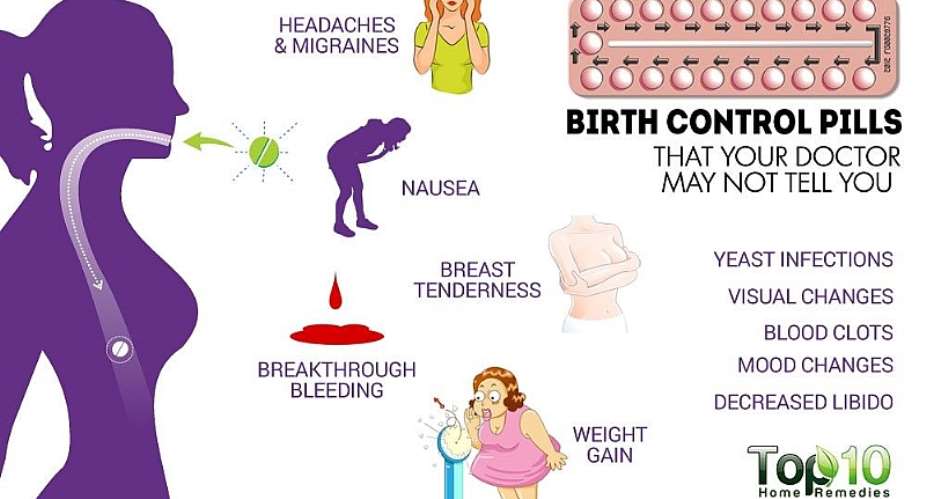Did you know that contraceptives are dangerous to human health?
In Ghana, 50% of female youths use contraceptives as a way of escaping pregnancy. But has any of them thought of the implications they may go through in some years to come? NO?
Although the contraceptives that couples use to avoid pregnancy have their health risks, they also have substantial non-contraceptive health benefits. Information about these risks and benefits is necessary for informed decision-making.
According to the National Cancer InstituteTrusted Source, taking birth control pills can affect a person’s risk of certain cancers in the following ways:
Breast cancer: The risk of breast cancer is slightly higher in people who use hormonal birth control pills than in people who have never used them.
Ovarian and endometrial cancer: These cancers seem to be less likely to occur in people who take the pill.
Cervical cancer: Taking the pill for longer than 5 years is linked with a higher risk of cervical cancer. However, most types of cervical cancer are due to the human papillomavirus.
Colorectal cancer: Taking the pill is linked to a lower risk of colorectal cancer.
These are some common side effects of oral contraceptives.
1. Spotting between periods
Breakthrough bleeding, or spotting refers to when vaginal bleeding occurs between menstrual cycles. It may look like light bleeding or brown discharge. Spotting is the most common trusted Source side effect of birth control pills. It happens because the body is adjusting to changing levels of hormones, and the uterus is adjusting to having a thinner lining.
Taking the pill as prescribed, usually every day and at the same time each day can help prevent bleeding between periods.
2. Nausea
Some people experience mild nausea when first taking the pill, but this usually subsides. Taking the pill with food or at bedtime may help. Birth control should not make people feel sick all the time. If the nausea is severe or lasts for a few months, it is best to talk to a healthcare provider.
3. Breast tenderness
Taking birth control pills often causes the breasts to feel tender, especially soon after a person starts taking them. Wearing a supportive bra can help reduce breast tenderness. Along with increased breast sensitivity, the hormones in the pill can make the breasts grow bigger. Learn more here.
A person should talk to their healthcare provider about severe breast pain or other breast changes, especially a new or changing breast lump.
4. Headaches and migraine
The hormones in birth control pills can cause or increase the frequency of headaches and migraine. Changes in the female sex hormones (estrogen and progesterone) can trigger migraineTrusted Source. Symptoms can depend on the dosage and type of pill. For example, low-dose pills are less likely to cause this symptom.
It is important to note that birth control pills do not prevent sexually transmitted infections (STIs). Only barrier methods of protection, such as condoms and dental dams, can prevent STIs.
Condoms are barrier methods of birth control. There are many types and brands. Most are made from latex, but people with a latex allergy can find polyurethane or lambskin versions.
With typical use, 18 out of 100 peopleTrusted Source who rely on male condoms for contraception will become pregnant within a year.





 Akufo-Addo’s govt is the ‘biggest political scam’ in Ghana’s history – Mahama ja...
Akufo-Addo’s govt is the ‘biggest political scam’ in Ghana’s history – Mahama ja...
 Performance Tracker is not evidence-based — Mahama
Performance Tracker is not evidence-based — Mahama
 Four arrested for allegedly stealing EC laptops caged
Four arrested for allegedly stealing EC laptops caged
 $360 million IMF bailout not enough for Ghana – UGBS Professor
$360 million IMF bailout not enough for Ghana – UGBS Professor
 Shrinking Penis Allegations: Victim referred to trauma hospital due to severity ...
Shrinking Penis Allegations: Victim referred to trauma hospital due to severity ...
 Adu Boahen Murder: Case adjourned to May 9
Adu Boahen Murder: Case adjourned to May 9
 ‘I've health issues so I want to leave quietly and endure my pain’ — Joe Wise ex...
‘I've health issues so I want to leave quietly and endure my pain’ — Joe Wise ex...
 Let’s help seek second independence for Ghana before NPP sells the country – Law...
Let’s help seek second independence for Ghana before NPP sells the country – Law...
 New Force aims to redeem Ghana and West Africa — Nana Kwame Bediako
New Force aims to redeem Ghana and West Africa — Nana Kwame Bediako
 ‘I didn't say I would buy Ghana if voted against; I said I’ll buy it back from f...
‘I didn't say I would buy Ghana if voted against; I said I’ll buy it back from f...
